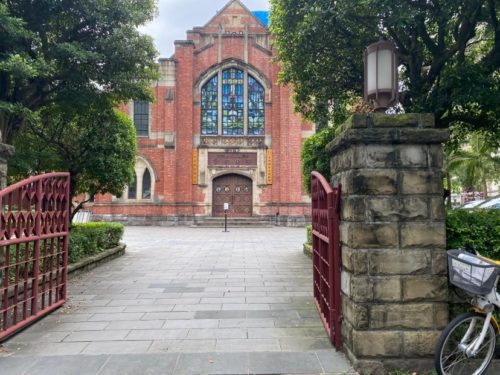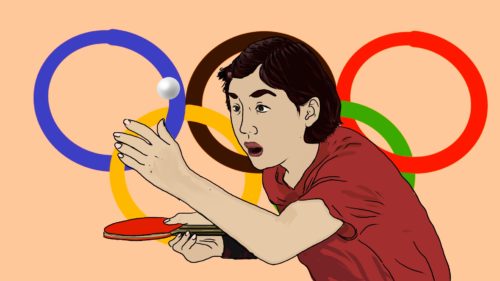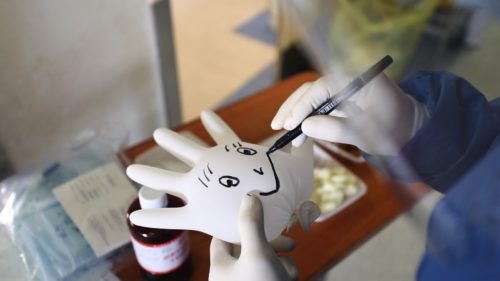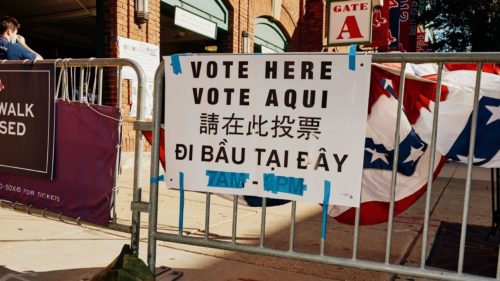The Grieving and the Grievable
In the wake of the March 16 shootings in Atlanta, Yangyang Cheng reflects on life as a Chinese immigrant amid escalating racial violence and geopolitical tensions. Caught between an authoritarian homeland and an increasingly hostile U.S., how does one live conscientiously? Who grieves, and what makes a life grievable?

When “breaking news from Atlanta” popped up on my timeline, I was attempting to write. I was momentarily irritated, mostly at myself, that I was checking Twitter instead of writing. I was also irritated at the world, where bad things kept happening, distracting me from my work.
I clicked on the headline. In the seconds it took for me to grasp the information, an innocence was lost that cannot be regained. Eight people were killed. Six of them were Asian women. My identity was the target of a mass shooting. A simmering rage rooted in centuries of bigotry, ignited by a pandemic and inflamed by geopolitics, had exploded in a hail of bullets.
My phone buzzed with messages from concerned friends. I responded curtly and went back to the page. It was almost ironic that I was writing about the start of COVID-19, how governments had failed and what lessons could be learned. The pen had guided me to the beginning. If only I could cast the line of words like a ribbon into the gears of time. Stop. Rewind. Instead, the line had formed a circle. All the death and devastation collapsed at its center. I felt breathless beneath the weight. My heart clenched like a fist. I typed in a frenzy, throwing letters and syllables onto the screen like twigs tossed against the floodgate of grief.
When I opened the draft the next day, the sentences were garbled, the thoughts murky, as if the paragraphs had been soaked in water, the ink eaten up by tears.

In the first months of the pandemic, being a Chinese immigrant in the U.S. meant living in two timelines at once, the mind several weeks ahead in the old country, the body lagging behind on the new land. To most Americans, the virus was over there.
Racism traveled faster than the disease. Incidents of harassment and assault against Asians were reported across North America and Europe. An item as basic as the mask was racialized. A few square inches of fabric tied to pieces of elastic became a symbol of Asian pathology. My mother sent a flurry of texts from China. Her WeChat groups for parents with children overseas were filled with discussions of whether or not their kids should put on a mask in public. The risk of infection was weighed endlessly against the risk of being a subject of racial hatred.
If no one around you wore a mask, maybe you should not either, my mother wrote, her anguish evident in long, hesitant messages. My mother does not speak English or know much about the U.S., but instinctively she understood that racism can be more dangerous than the coronavirus.
To live conscientiously as a Chinese person is to assume a perpetual state of guilt.
One evening in early February of last year, I was waiting for take-out at a Thai restaurant close to my place. The TV behind the check-out counter was tuned to CNN. The sound was off. A silent newsreel showed images from Wuhan, crowded hospitals, desolate streets. I stared at the screen, not that there was much to see, but it felt wrong to look away.
Then I heard my name. The young woman had emerged out of the kitchen and was packing up an order before mine.
“We worried about you!” she said. “Your family, they in China? They okay?”
I had visited the restaurant often since moving to this neighborhood, my interactions with the staff limited to simple greetings and contents of the menu. I had not expected to be seen as anything more than a customer. The sudden kindness was almost disorienting.
I told her that my family is fine: they live far from Wuhan; thank you for asking. But what I really wanted to say was that I’m sorry. I had an inexplicable urge to apologize for my country. The restaurant was busy. The pandemic seemed like a distant story, told by a metal box on the wall. What would happen to this place, its people and their livelihoods, once the virus made its way here, as it most certainly already had?
In the early days of the outbreak, the Chinese government had downplayed its severity and concealed information. People in China, in particular the residents of Wuhan, bore the brunt of the cost. The initial delay in alerting the public would soon be inconsequential to the pandemic’s trajectory in the U.S., due to the latter’s own mismanagement, but on that early February evening, I felt personally responsible. I had not lived in China for over a decade, but as a Chinese citizen born and bred, was I not complicit in its government’s actions?
To live conscientiously as a Chinese person is to assume a perpetual state of guilt. I realized how I felt toward the Thai worker was similar to how I feel around friends and colleagues from Hong Kong or Taiwan, or when encountering people of Uyghur descent. From an ocean away, I write essays critical of Beijing’s oppressive policies, but words are feeble, even selfish. Whom have my words helped other than myself, a clumsy gesture at atonement?
Valid critique of the Chinese government treads a fine line. The prevalent argument easily slides into muddy waters of racism or gets distorted by partisan interests. To many in the West, my people are either barbarians whose exotic eating habits attracted new pathogens or a futuristic race who engineered the virus as part of their plan for global domination.
I watched the Thai worker staple my receipt on top of a paper bag. To the undiscerning white gaze, she could be mistaken as Chinese. Many a time at this restaurant, a customer would signal to me and ask for the menu or a glass of water, assuming that I worked there.
Since the Chinese Exclusion Act of 1882, subsequent waves of new immigrants from Japan, Korea, and the Philippines had tried to distinguish their ethnicity from that of earlier arrivals, hoping for better treatment, only to find out that discrimination knew no bounds. In 1982, the Chinese American Vincent Chin was beaten to death by two white Chrysler workers who blamed the Japanese auto industry for layoffs in the U.S. I could not have foreseen that in a year, four Korean and two Chinese women would be gunned down amid heightened tensions between China and the U.S., but that evening, my sense of responsibility toward the Thai woman was compounded by a recognition of our bond.
When I picked up my order, the bag was much heavier than expected. “I give you free pad thai,” she said.
I came back to the restaurant the next day, and many more days after that. Bottles of hand sanitizer were placed on the counter. A plexiglass barrier was added. Chairs were pulled away from tables and stacked by the wall. The hours and the staff were cut. Another February came and went. The place has stayed open. The pad thai is still good.

The Saturday morning after the shootings, I woke up to a voicemail from my mother. The audio format, instead of the usual text, conveyed the urgency.
I heard there are protests scheduled this weekend against anti-Asian violence, my mother said. Please, please, do not go. I am begging you.
There were no demonstrations in Chicago that I knew of, though later I saw photos of a small information session in Chinatown. In this rare instance, I did not defy my mother’s wishes.
My mother has been warning against active political participation for as long as I can remember. Affairs of the state were taboo in my family. Before I left China for graduate school in the U.S., she repeated her prohibitions, while begrudgingly acknowledging their futility. I was eager to live in a free society and exercise the rights my birth country had denied me.
Some things have changed over the past year. When my mother tells me to stay away from politics, to keep my head down and my mouth shut, her reasons are no longer a simple mistrust of the political process, nor is she requesting from a position of parental authority. It does not matter what the cause is, whether she agrees with it or considers it someone else’s business. The closer the subject is to my being, like anti-Asian racism, the more nervous she gets, terrified that my passion for justice would be swept up by darker forces beyond my control. She has watched the rapid deterioration of U.S.-China relations, told through the increasingly jingoistic language of Chinese state media. Powerless against the clashing tides of geopolitics, she tries to keep her only child away from the frontlines.
“It is not your country,” she repeats. What my mother means is that the United States is not my country because I’m Chinese and it can never be my country because I’m Chinese. I’ve never mentioned my writings on China to her, yet she has indicated — without saying so explicitly — that she knows. She reminds me that a wise person does not burn all the bridges, that I should leave myself a hòulù 后路, back route, in case my current country of residence becomes too hostile. What my mother does not realize, and many in the West do not either, is that when I write harshly about the Chinese government and its abusive policies, with full awareness of the risks, it is not an act of severance from my homeland, nor is it a cheap bargain to curry favor with another country and seek its acceptance. My words are a way of reclaiming, to assert my identity and heritage against forced appropriation and erasure by opposing states.
Being “tough on China” is brandished as a measure of personal virtue. Denouncing the country has become a competitive sport. The worst atrocities of the Chinese regime are tokenized to advance partisan agendas.
Last year, on the 31st anniversary of the Tiananmen crackdown, I spoke at a panel hosted by a California-based organization on the significance of the event and the ongoing pro-democracy protests in Hong Kong. During Q&A, an audience member asked if the Chinese government would send in tanks to Hong Kong as it did three decades ago to the nation’s capital.
It was not the first time that I had heard this question. The speculative game starts anew each time there’s a mass demonstration on Chinese soil, as if more Chinese lives should be lost to prove a point. Beijing has shown the world what it is capable of, and Chinese blood has been spilled because of it. Those who casually raise the prospect of “another Tiananmen” are not trying to gain insight into Chinese governance, nor are they concerned with preserving life; they are intrigued by the spectacle. The shocking visuals of state violence, inflicted on non-white bodies in a foreign land, help affirm their sense of superiority. The safety of distance maintains their innocence. When they feel genuine sorrow or outrage for the victimized, the emotional response absolves them of further obligations or the need for self-reflection.
Here in the U.S., professionals who report on or study Chinese policy are referred to as “China watchers” or “China hands.” The terminology, with origins in British colonialism and intelligence gathering, implies an othering stance. The watcher is always detached. The hand probes from the outside. Both are coded as white. Chinese ethnicity in this profession is viewed as suspect. Any attempt to introduce nuance is dismissed as apologizing for Beijing. Combine the two, and one gets labeled a Communist spy. Being “tough on China” is brandished as a measure of personal virtue. Denouncing the country has become a competitive sport. The worst atrocities of the Chinese regime are tokenized to advance partisan agendas.
“The Chinese Communist Party does not equate the Chinese people and criticizing the former is not racist,” politicians and pundits proclaim. The soundbite, objectively true by stating the obvious, is rarely uttered in good faith. It is a way of talking to preclude further discussion, a preempt to deflect from criticism. What the sentence actually says is that the speaker comprehends very little — and does not care to know more — about the workings of a one-party state, the role of the individual in an authoritarian society, or racial bias in the discourse about China. They see the Chinese people as helpless victims or mindless perpetrators of political oppression, but never fully enfranchised human beings with moral agency, who must navigate a complex reality in order to live. Their refusal to understand China for what it is belies a deeper insecurity, a reluctance to accept their privileges as unearned, a fear that their purported values would crumble if the liberties they took for granted exacted a cost. China’s economic rise has shattered the convenient narrative that material abundance beckons political freedom. Instead of confronting the structural rot in their own society, it is much easier, and politically expedient, to cast China as the primary threat, the stealer of jobs, the exporter of autocracy, the cause for American decline and the crisis of democracy everywhere.
I do not know what shape this version of “China” holds, where it begins or where it ends. But I do know every configuration of its border runs through my body.

“I’m 69 years old. And I’m going to show you what patriotism, the questions about (what) patriotism looks like.”
In the video, the man is seated behind a long table. The name plate in front of him reads “Lee Wong.” He slowly unbuttons his shirt, untucks it, and lifts the tank top underneath.
“Here is my proof.” Lee Wong stands up, his scarred chest bare. The camera zooms out to show a stage where four of Wong’s white colleagues look on. An American flag and an Ohio flag stand in the background.
“This is sustained through my service in the U.S. military. Now, is this patriot enough?”
During the Japanese internment in WWII, every adult held at the camps had to answer a loyalty questionnaire:
Question 27 (for men), Are you willing to serve in the armed forces of the United States on combat duty, wherever ordered?
Question 28, Will you swear unqualified allegiance to the United States of America and faithfully defend the United States from any and all attacks by foreign and domestic forces, and forswear any form of allegiance or disobedience to the Japanese Emperor, or any other foreign government, power, or organization?
Due to racist policies intended to keep America white, most Asian immigrants at the time were not eligible for U.S. citizenship. In the eyes of the U.S. government, the Isseis and their American-born children, regardless of their citizenship status or political beliefs, had sworn loyalty to the Japanese Emperor by way of their ethnicity. Their only redemption for this sin at birth was to fight and kill and die for a country that never wanted them in the first place.
Nisei soldiers, placed in racially segregated units, fought in some of the most gruesome battles in Europe and North Africa. After the war, President Harry S. Truman received them at the White House.
“You fought not only the enemy, but you fought prejudice — and you have won,” said the man who ordered the atomic bombings of Hiroshima and Nagasaki. “Keep up that fight, and we will continue to win — to make the great Republic stand for just what the Constitution says it stands for: the welfare of all the people all the time.”
I’ve often pictured myself facing a similar loyalty questionnaire, where the words “Japanese Emperor” were replaced by “Chinese Communist Party.” I reckon that for better or worse, my gender would spare me the horror of bearing arms for a state. In the patriarchal imagination, the female body is an extension of the land, a site of conquest. The fetishization of Asian women as sexual objects also traces to decades of U.S. imperialism and military presence in Asia, from the Philippines to Japan, from Korea to Vietnam.
No earthly powers extend beyond the mortal plane. The world of mourning is the only world where every soul touched by loss stands equal.
The viral video of Lee Wong was filmed at a town hall in Ohio, one week after the shootings in Atlanta. Wong emigrated to the U.S. at 18 and serves on the town board. When I saw the clip, my first reaction was to look up which war he had fought in. I learned that he had sustained the injuries in training at Fort Jackson in South Carolina and felt an instant, selfish relief. That the scars are not a result of direct combat means I do not have to place another face next to Wong’s. The morals of his story are complicated enough without the implication.
“The face is not in front of me, but above me; it is the other before death, looking through and exposing death…the face says to me: you shall not kill,” writes Emmanuel Levinas. To be exposed to the vulnerability of the face is to reflect on one’s ethical responsibility to the other, to reject the narrow refrain of self-survival, to accept that one’s place in this world — and what gives it meaning — is never accomplished by the self alone.
In a war there are no faces, only bodies. The face of a person is replaced by the image of a flag. When politicians gravitate toward war or its proxies, like “great power competition,” it is not just the face of their alleged adversary, but also that of their own that they cannot bear to see. They hope for a manufactured scenario that reduces all of their problems, crises in governance as well as identity, into a false binary: us versus them, victory or defeat, to kill or be killed.
Bad ideas do not die with the people who hold them. Nor can ideas be confined by artificial boundaries of the state. Those who claim that war is about values have been convinced of their own lies. War is the ultimate destroyer of value in pursuit of absolute power. The logic of war not only justifies dehumanization, it demands such. No society enters war with its values intact. To debase the other is to debase oneself.
In Bring the War Home, the historian Kathleen Belew documents how the aftermath of the Vietnam War led to the rise of the white power movement in the U.S., culminating in the Oklahoma City bombing in 1995. Anti-Communist sentiments during the Cold War were detrimental to the advancement of racial justice and labor rights. The never-ending “War on Terror” has bred Islamophobia, curtailed civil liberties, and put military-grade weapons and surveillance software in American streets.
What does patriotism look like? I replay the video of Lee Wong and study the shape of his scar. Stretched across his chest and slightly curved, with a sharp bend in the middle pointing up, it resembles the outline of a harness, or that of wings reversed. It is a map of a battlefield.

Days after the shootings, President Joe Biden and Vice President Kamala Harris made a pre-scheduled trip to Atlanta, where they both spoke on the incident and condemned racial violence. I watched a recording of their remarks. In a meandering speech that covers support for Asian communities, COVID response, voting rights in Georgia, and tax reform, the president concluded on an emotional note. Addressing the families of the victims, he said:
“The day will come when their memory brings a smile to your lips before it brings a tear to your eye, as unbelievable as that is now. It will take a while, but I promise you that it will come.
“And when it does, that’s the day you know you’re going to make it.”
I’ve heard the same words numerous times before from the same man. I do not recall the exact occasion I first encountered them, but it must have been not long after I had arrived in the U.S., in the early days of the Obama presidency. It probably says more about me that I’ve taken note of them over the years: in a TV interview, on a campaign stump, in the aftermath of a tragedy or on the anniversary of a disaster, Joe Biden steps into his role as consoler-in-chief.
I was asked during a recent interview what I would tell Biden if I had a chance to speak with him. It’s a flattering question, the subtext being what kind of policy advice I would give to the White House. I understand the allure of institutional power, but I have little interest in speaking with Biden in his capacity as president. That’s no premise for an equitable exchange.
The conversation I can imagine having is one between two people in grief. No earthly powers extend beyond the mortal plane. The world of mourning is the only world where every soul touched by loss stands equal. Despite all of our differences, I’m indebted to Biden for his generosity, that by opening up about the terrible absences in his life, he’s created a form of presence, a tender corner where anyone can come in, grieve their grief, and not be lonely. When a young Chinese woman, fresh off the plane, stumbled upon that gentle embrace, the planet became a little less haunted, the country a little less foreign. For that, I’m forever grateful.
Close to three million people have died from COVID-19, more than the entire population of Chicago. I sit in my apartment overlooking the city and picture the landscape devoid of humans. Cars would rust in the streets. All the buildings would go dark. Grass would grow over the pavements. A hungry dog would bark. I stay with the thought and let grief wash over me. After over a year of quarantine, this time of solitude is also a solemn reminder of how intimately connected we are with everything that’s alive and everything that’s ever been alive.
“Whose life appears as a life, and whose loss would register as a loss?” The philosopher Judith Butler poses these questions. “What makes for a grievable life?” When our concept of humanity is carved up by races, nations, and ideologies, some lives are deemed more grievable than others. Wars, prisons, militarized borders, structural inequalities and discriminatory policies: in seeking to protect a select “us,” we make life more precarious for the other.
But the body we claim autonomy over is never ours alone. To exist in this world is to be undone by each other. In grief the order breaks; any sense of normalcy is taken away. A person mourns by undergoing a transformation, where a greater, egalitarian truth is revealed. Life is precious because it is finite; its loss must be grieved now when there is still time, because that is how much a life deserves to be loved.
In 1838, the Cherokee people of present-day Georgia were forced by the U.S. military to move west. The route where thousands perished is known as the Trail of Tears. Almost two centuries after, at a shopping center named Cherokee Village in the state capital, 44-year-old Daoyou Feng was killed in a shooting rampage that claimed seven more lives. A Chinese national, Feng had no family in the U.S. and was new to the area. Her body lay unclaimed for seven days. The Chinese-American community arranged for her funeral. Dozens of strangers came to the service. One of them drove four hours.
“She doesn’t have family here, so I consider us her family,” the man told the Wall Street Journal. Feng had planned to go back to China in 2020 and start a small business in her hometown. She had been saving up for it. Then the pandemic hit and borders were closed.
“My heart is moved by all I cannot save: / so much has been destroyed,” writes Adrienne Rich.
I have to cast my lot with those
who age after age, perversely,
with no extraordinary power,
reconstitute the world.
Read more of Yangyang Cheng’s Science and China Column on The China Project.





